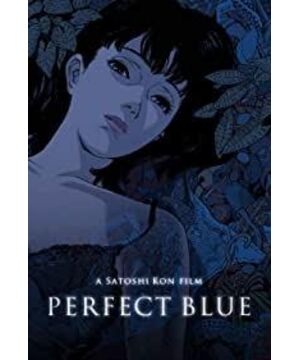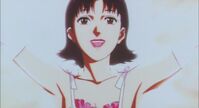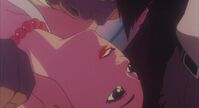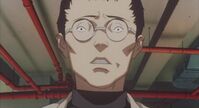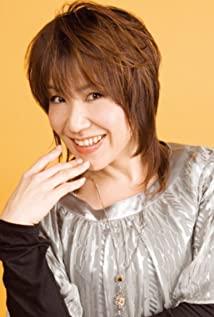Jin Min started his career with the alternation of reality and illusion at the master level, and he still lives on this to this day. In "Agent of Delusion", his old style is still present, and this is omitted. Let's just talk about this virgin masterpiece "Perfect Blue".
The story never begins when he gives up the idol singer and becomes an actor. It was a set of parallel shots, at the same time explaining Wei Ma’s curtain call performance and her state after returning home. The main characters were cleverly put on the stage, which had the first effect, and then the strange things that happened after Wei Ma returned home. The incident, it was Wei Ma who showed a sense of horror about the weird incident. From the beginning, I believed that Wei Ma was just a poor ordinary person, without dual personality. Later, I kept seeing phantoms, and it was more like someone was pushing them with ulterior motives. . Considering the actual conditions required to commit the crime, it is not difficult to guess the real murderer.
The following story has been alternating between the illusion of Wei He and the real bloody murders happening around her, occasionally appearing in the lens of a crazy fan with a terrifying face. So of course, the reader’s guess oscillates between the two options, and unknowingly forgets the third possibility. This is the magic weapon for the success of the suspense film. The early suspense was to deliberately steer the film in one direction, and then quietly lay out clues to the other side, allowing the truth to come unexpectedly and for granted. However, the suspense skills that modern readers have long been abused have tempered the fire-eye stars, and the one-sided method alone has no effect on them, so there is a new way to deliberately make people fall into one of two choices.
According to a teacher from New Oriental, he asked when he was a salesman in his early years, do you want this? What about this one? In the end, they often come back unfailingly. Later he found out that it is better to ask instead, do you want this or that? As a matter of course, the customer is stuck in the dilemma of choosing one of the two, completely forgetting that he can actually veto it at the same time.
Laugh, this is the so-called human nature.
I only talk about the storytelling skills of the story itself. This is not necessarily Jin Min’s contribution, more likely to be the original author’s credit. What I want to talk about below is how he deliberately blurred the boundary between reality and fantasy.
In the story, both Wei Ma and the fans have clear images explaining the phantoms they saw, and the phantoms of the two are very close. They are both images of Wei Ma when he was an idol singer, and both show signs of expansion as the story progresses. Just like this, I'm afraid that smart modern people can't be trapped in the clouds and fog, so another layer is added, the image in the drama played by Wei Ma. Wei Ma in the drama also plays a schizophrenic character. According to the habit of Japanese animation who likes to reflect in and out of the play, this is equivalent to adding another layer of weight to the option of Wei Ma’s schizophrenia. With the influence of classic plots such as "fight club", it is estimated that when the story enters the most incomprehensible stage, most moviegoers are already inclined to this option. Under such emotions, what made the famous set of Xingyun Liushui scenes fall into the state of insoluble is the alternate scenes of Wei Ma acting three times and Wei Ma waking up from his room. Generally speaking, the scenes of waking up from dreams are often used to illustrate that the protagonist’s experience just now was all dreams, so we take it for granted that Wei Ma is dreaming. But Wei Ma's acting was a real plot before. So, do we need to deny the previous plot understanding? Given that Wei Ma does have a tendency to schizophrenia, this view is understandable. But it is easy to forget that the awakening scene can be simply understood as the editing of the montage time that we are familiar with and ignored. Because we cut off the scenes of Wei Ma leaving get off work and the scenes of Wei Ma sleeping, so of course, we doubted the authenticity of the scene just now, doubted the authenticity of the previous plot, and tried to overturn all previous opinions.
When Wei Ma was raped by a fan, and after killing the fan and finding the fan's body missing, everyone desperately believed that Wei Ma must be crazy and laughed.
So, I said that the so-called alternation of reality and fantasy is simply omitted, or deliberately misused the iconic lens in the movie that implies "this is reality" and "this is fantasy". Will this be beaten?
Also, I would like to say that this film obviously uses the mindset of those of us who think we are full of art films, and "fight club" also makes a lot of contribution.
However, in fact, I shyly admitted that I guessed the correct answer at the beginning, but in the end, before the gorgeous replacement camera, I shaken my thoughts, and I didn't find it until the end. The author's ability to mislead people is not so great.
If you look back with the answer, in fact, there are quite a lot of foreshadowings that hint at the ending in the story. First of all, Weima doesn’t know how to use a computer, and he doesn’t have one at home. The mind can be split, but the hardware conditions are impossible to change. Therefore, the “Weima’s Department House” is definitely not Weima’s handwriting, so who taught Weima’s computer knowledge? Woolen cloth? Who has the conditions to understand Wei Ma's life so much, write a diary that puzzles her, and enter Wei Ma's house to do things? The writer’s death, the elevator came down, there was a radio inside, and he was raided behind him. At the speed of the elevator, it couldn’t be done by one person, right? When the unnumbed fish died, she was filming. Who was absent when she left early?
Another thing that can help understand is another routine of suspense films: if you see someone for the first time and then find that you don't see it, it is usually not an illusion, but the murderer runs away at a certain magical speed. Remember to remember. If the protagonist says that he saw something and then a supporting actor resolutely denies and tries to persuade the protagonist, then what the protagonist saw must be true, so remember.
Jin Min's scissors are really powerful. They can lay so many clues leisurely, and use so many old routines without getting caught. This is due to the difficulty of interpretation caused by the addition of the second selection and the alternation of lenses. To some extent, Perfect Blue is a masterpiece of the psychological suspense film technique. Considering that the author was still a newcomer at the time, there are only two words: admire.
View more about Perfect Blue reviews


